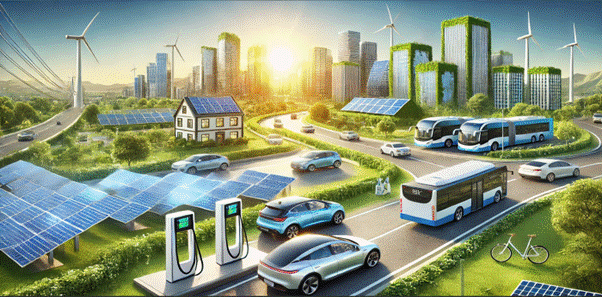The Future of Electric Vehicles: Are We Ready for a Transportation Revolution?
The automotive industry is undergoing a massive transformation with the rise of electric vehicles (EVs). As concerns about climate change and fossil fuel dependency grow, EVs are seen as the future of transportation. But are we truly ready for this revolution? This blog explores the advancements, challenges, and future of electric mobility.
Introduction
The automotive industry is undergoing a massive transformation with the rise of electric vehicles (EVs). As concerns about climate change and fossil fuel dependency grow, EVs are seen as the future of transportation. But are we truly ready for this revolution? This blog explores the advancements, challenges, and future of electric mobility.
The Growth of Electric Vehicles
The EV market has seen exponential growth in the past decade. Governments worldwide are encouraging the adoption of EVs through incentives, subsidies, and strict emission norms. Companies like Tesla, Rivian, and traditional automakers such as Ford and Volkswagen are investing heavily in electric mobility.
Advantages of Electric Vehicles
EVs offer several benefits over conventional fuel-powered vehicles:
Environmentally Friendly: EVs produce zero tailpipe emissions, reducing air pollution.
Lower Running Costs: Electricity is cheaper than gasoline, and EVs require less maintenance.
Energy Efficiency: EVs convert a higher percentage of energy from the battery to motion compare to internal combustion engines.
Quiet and Smooth Drive: EVs operate with minimal noise and vibration, improving driving comfort.
Challenges Facing Electric Vehicles
Despite their advantages, EVs face several obstacles:
Charging Infrastructure: The availability of charging stations is still limited in many regions.
Battery Technology: While battery costs are decreasing, their production is still expensive, and recycling remains a challenge.
Range Anxiety: Many consumers worry about the limited range of EVs compared to traditional vehicles.
Initial Cost: EVs are still more expensive upfront than gasoline-powered vehicles, though prices are expected to drop.
Government Policies and Incentives
Governments worldwide are pushing for EV adoption through various measures:
Tax incentives and rebates for EV buyers.
Investment in public charging infrastructure.
Policies promoting research and development in battery technology.
Future Innovations in Electric Mobility
The EV industry is continuously evolving with new technologies:
Solid-State Batteries: Promising longer range and faster charging times.
Wireless Charging: Eliminating the need for plug-in charging stations.
Autonomous EVs: Self-driving electric cars will redefine transportation.
Solar-Powered EVs: Vehicles integrated with solar panels for additional energy efficiency.
The Role of Renewable Energy in EV Adoption
For EVs to be truly sustainable, they must be powered by clean energy sources such as solar, wind, and hydroelectric power. Transitioning to renewable energy for charging stations will further reduce the carbon footprint of EVs.
Are We Ready for the EV Revolution?
The transition to EVs is inevitable, but readiness varies across different regions. Developed nations are ahead in infrastructure, while developing countries still face challenges in affordability and charging network expansion. However, with rapid advancements in technology and supportive government policies, EVs are set to dominate the future of transportation.
Conclusion
Electric vehicles are not just a trend—they are the future. As technology improves and infrastructure expands, EVs will become more accessible and efficient. The shift to electric mobility will lead to a greener planet, reduced dependency on fossil fuels, and a more sustainable transportation system. The question isn’t whether EVs are the future—it’s how soon we’ll be fully ready for this revolution.
.png)






Leave a Comment
Your email address will not be published. Required fields are marked *